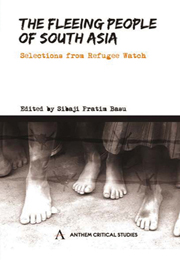Book contents
- Frontmatter
- Contents
- Acronyms and Abbreviations
- Foreword by Ranabir Samaddar
- Preface
- ETHICAL ISSUES
- LAWS
- SOUTH ASIA
- Introduction
- Refugees in South Asia: An Overview
- Internally Displaced Persons in Sri Lanka
- A Matter of Ethnicity
- Scrutinizing the Land Resettlement Scheme in Bhutan
- The Taliban Shelter Seekers or Refugee Warriors?
- Afghan Refugees head for Tajikistan, holed up in the Pamir Mountains
- Impact of International Jurisdiction on Afghan Refugee Rights
- Development Induced Displacement in Pakistan
- On the Trail of Burma's Internal Refugees
- Assault on Minorities in Bangladesh: An Analysis
- Neoliberal Globalization and Women's Experiences of Forced Migrations in Asia
- Who Went Where and How are They Doing? Pakistanis and Indians Outside South Asia
- INDIA
- GENDER
- INTERVIEW/CORRESPONDENCE
- REPRESENTATIONS
- Index
The Taliban Shelter Seekers or Refugee Warriors?
from SOUTH ASIA
Published online by Cambridge University Press: 05 March 2012
- Frontmatter
- Contents
- Acronyms and Abbreviations
- Foreword by Ranabir Samaddar
- Preface
- ETHICAL ISSUES
- LAWS
- SOUTH ASIA
- Introduction
- Refugees in South Asia: An Overview
- Internally Displaced Persons in Sri Lanka
- A Matter of Ethnicity
- Scrutinizing the Land Resettlement Scheme in Bhutan
- The Taliban Shelter Seekers or Refugee Warriors?
- Afghan Refugees head for Tajikistan, holed up in the Pamir Mountains
- Impact of International Jurisdiction on Afghan Refugee Rights
- Development Induced Displacement in Pakistan
- On the Trail of Burma's Internal Refugees
- Assault on Minorities in Bangladesh: An Analysis
- Neoliberal Globalization and Women's Experiences of Forced Migrations in Asia
- Who Went Where and How are They Doing? Pakistanis and Indians Outside South Asia
- INDIA
- GENDER
- INTERVIEW/CORRESPONDENCE
- REPRESENTATIONS
- Index
Summary
The emergence of the Taliban as a phenomenon in Afghan politics is of striking significance both in the context of Islamic tradition as well as refugee behaviour. Migration or hijra (an Islamic religious term for migration) has often led to jihad (struggle) against the so-called enemies of the land and religion. The essential question here is: has this jihad been successful in bringing about peace in this war-torn land or have the people fighting jihad become a catalyst for further precipitation of the civil war?
The noun ‘refugee’ has a French origin and was adopted in the English language a century later. It was given a more institutionalized legal meaning by the 1951 UN Convention Relating to the Status of the Refugees and the subsequent 1967 Protocol. But the texts of Islam, especially the Holy Qur'an and the Hadith give a different name to migration of the Muslims. Migration after suffering oppression is hijrah and such a migrant is a mujahir. […] Hence, the universal legal framework of understanding the refugee situation is not significant for the Afghans or the average Muslim people in the neighbouring countries who have given refuge to the Afghan migrants.
M Nazif Shahrani says, unlike the widely used term mujahidin for Muslim fighters in the cause of Allah, Afghan resistance fighters are referred to by the companion term mujahirin, ‘those who leave their homes in the cause of Allah, after suffering oppression’, (Qur'an, 16:41) the appellation of choice for the displaced Afghans, is for the most part ignored by international relief organizations.
- Type
- Chapter
- Information
- The Fleeing People of South AsiaSelections from Refugee Watch, pp. 167 - 171Publisher: Anthem PressPrint publication year: 2009

